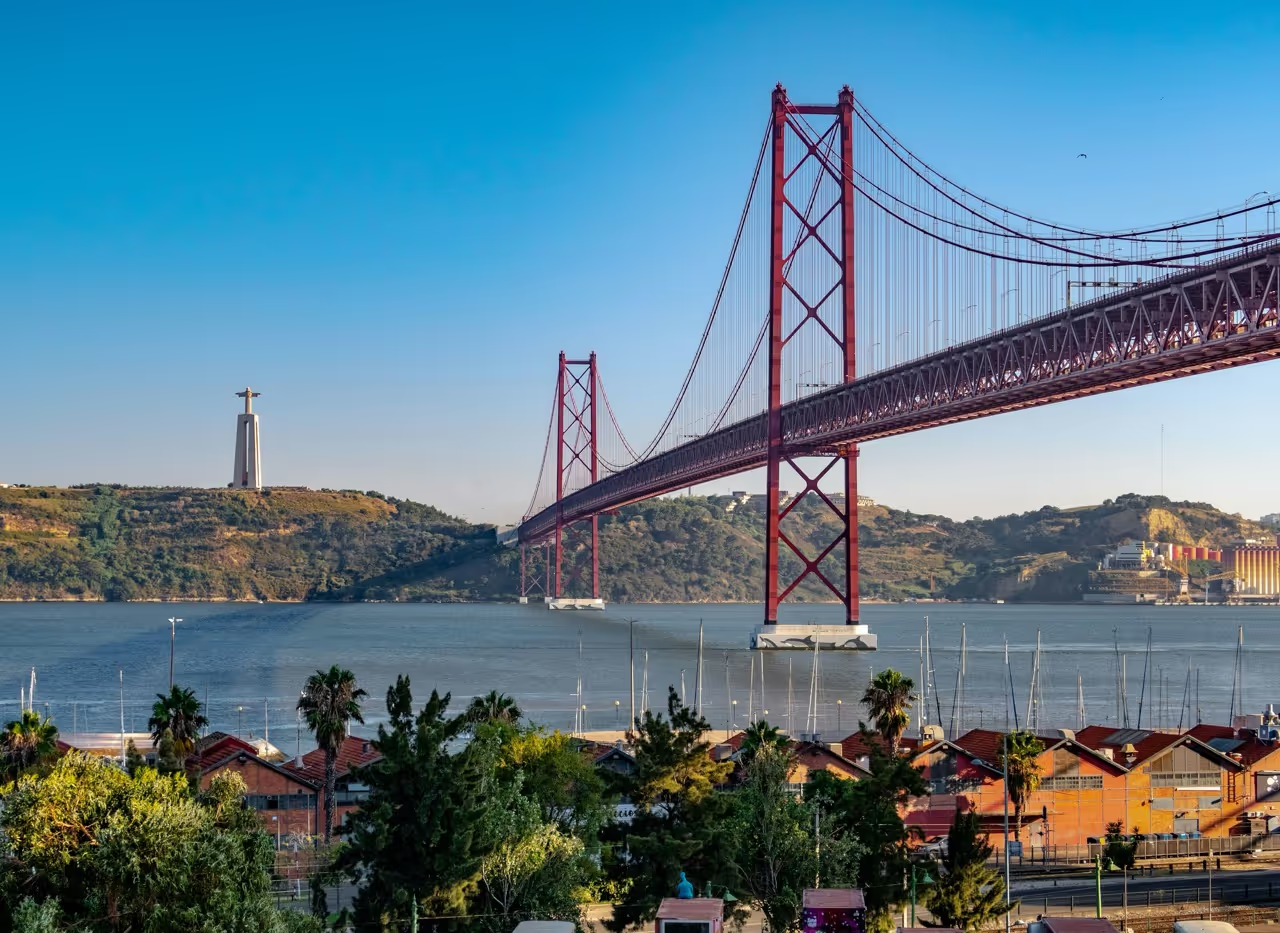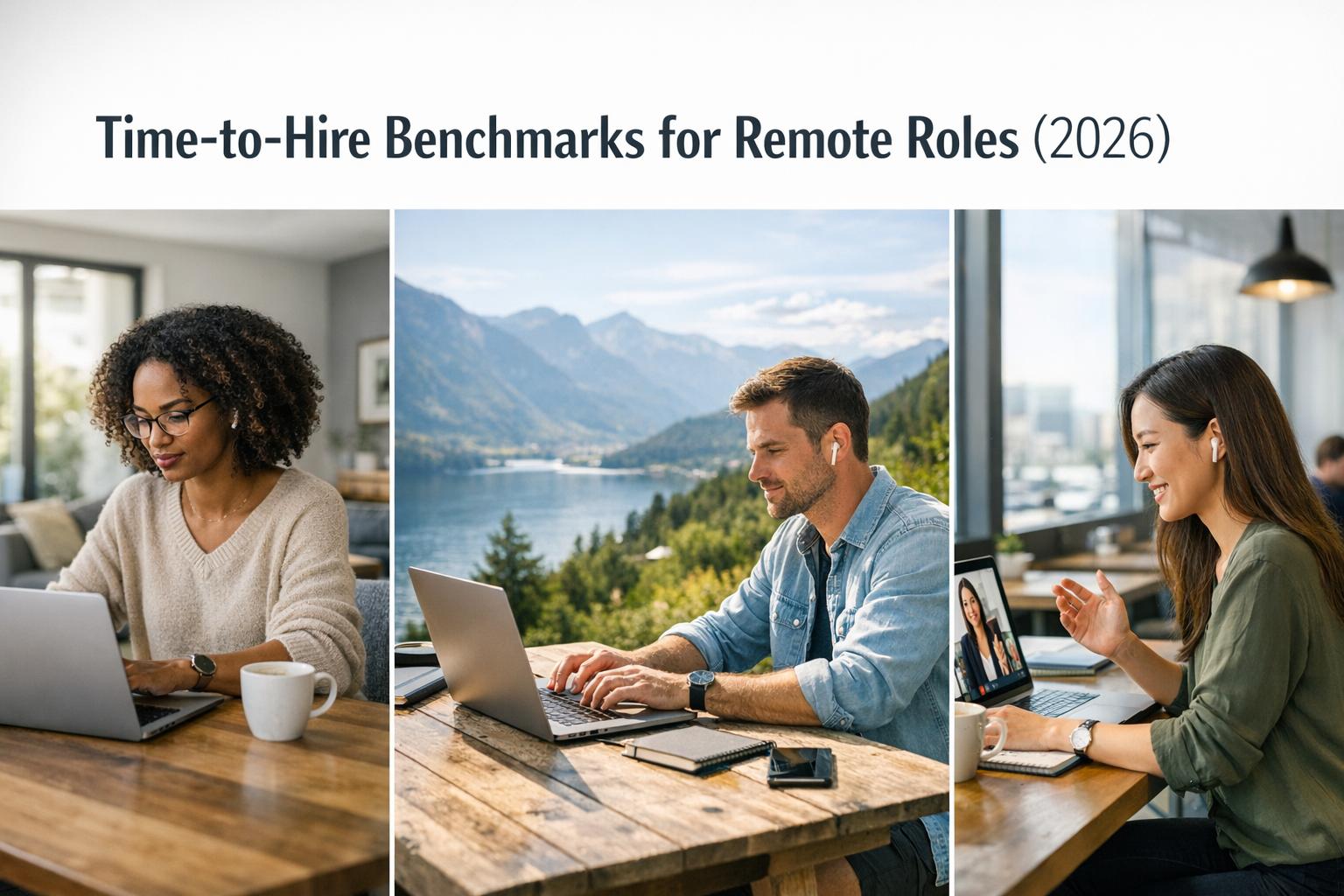How to Apply for a Digital Nomad Visa in Portugal

Portugal's Digital Nomad Visa (D8) is designed for remote workers outside the EU/EEA seeking residency while working for foreign clients. Here's what you need to know:
- Eligibility: Must be 18+ years old, non-EU/EEA citizen, and meet financial and employment criteria.
- Income Requirement: Minimum monthly income of €3,480 (~$3,700) from remote work, freelance, or self-employment.
- Savings Proof: €10,440 (~$11,100) in savings, plus additional funds for dependents.
- Documents Needed: Passport, proof of income, savings, health insurance, housing, criminal record, NIF, and NISS.
- Cost: Application fees range from €75–€120 (~$84–$134). Additional expenses include health insurance, housing deposits, and residence permit fees.
- Processing Time: Applications take ~60 days. After approval, a 120-day visa is issued, during which you must apply for a residence permit in Portugal.
This visa offers a pathway to stay in Portugal for up to five years, with options for permanent residency or citizenship. Early preparation is crucial to ensure a smooth application process.
Portugal Digital Nomad Visa: D8, D7, Eligibility, Requirements & Application with TOP EXPERT Paula
Who Can Apply and Basic Requirements
Portugal's Digital Nomad Visa has specific guidelines that applicants must meet. Below is a breakdown of the financial, personal, and logistical requirements for eligibility.
Monthly Income Requirements and Financial Documentation
To qualify in 2025, you’ll need to show a minimum monthly income of €3,480 (around $3,700). This income must come from remote work, self-employment, or freelance contracts with clients or companies based outside of Portugal. To verify your earnings, you’ll need to provide bank statements (covering the last 3–6 months) and payslips or tax returns that clearly show your after-tax income meets this threshold.
You’ll also need to prove savings of at least €10,440, which equates to roughly three months of the required income. If you have dependents, you’ll need to show additional funds: 50% more for a spouse/parent and 25% more per child.
Make sure all financial documents are current, and if they’re not in Portuguese, they must be officially translated. Submitting incomplete or outdated paperwork is one of the most common reasons for visa rejections.
Age, Citizenship, and Other Required Documents
Applicants must be at least 18 years old and must not hold citizenship in the EU or EEA. This visa is specifically designed for non-EU/EEA citizens - EU/EEA nationals don’t need this visa to live or work in Portugal.
Your passport must have at least six months of validity beyond your intended stay. Additionally, you’ll need a Portuguese tax identification number (NIF) and, starting in 2025, a Portuguese Social Security ID (NISS). These can be obtained through the Portuguese Social Security office or online.
A clean criminal record certificate is also mandatory. This document must be recent, and if it’s not in Portuguese, you’ll need to provide an official translation.
Health Insurance and Housing Documentation
Private health insurance valid in Portugal is required for the entire duration of your stay. Your policy must cover all potential medical expenses while you’re in the country.
You’ll also need to provide proof of housing arrangements. Acceptable documents include a rental agreement, hotel booking, Airbnb confirmation, or a host’s letter. Ideally, this proof should cover at least 12 months, but if your arrangements are shorter-term, you’ll need to present a clear plan for securing long-term housing.
These requirements are designed to ensure you’re financially secure and fully prepared for your stay in Portugal. Having all the necessary documentation in place will greatly improve your chances of a successful application.
How to Apply for the Visa
Once your documents are ready, it’s time to start your application process. The Portugal Digital Nomad Visa (D8) must be applied for through the Portuguese consulate or embassy in your home country or country of residence. In some cases, you can also apply through a VFS Global office if one operates in your area [3].
Filling Out the Application Form
To begin, download or pick up the official D8 Visa application form from your local Portuguese consulate, embassy, or VFS Global office [3]. Take your time to complete every section accurately - this is critical to avoid delays.
The form starts with your personal details, such as your full name, date of birth, passport number, and current address. Be sure these details match exactly with your passport and other supporting documents.
Next, you’ll need to provide financial information, including your monthly income and employment status. Double-check that these figures align with your bank statements and payslips.
There’s also a section on your travel history, where you’ll list previous international trips. Be precise here, as immigration officials may cross-check this information with your passport stamps.
Common errors include leaving sections blank, providing inconsistent details, or forgetting to sign and date the form [3]. Carefully review your entries before submitting to avoid unnecessary setbacks.
If you feel overwhelmed, consider consulting a service like Remotely Talents for guidance with your application and documents.
Once your form is complete, move on to gathering and submitting the required supporting documents.
Collecting and Submitting Your Documents
It’s essential to organize your documents exactly as outlined in the consulate’s checklist. Include both originals and certified copies, and ensure non-English documents are accompanied by official Portuguese translations. Here’s what you’ll generally need:
- A valid passport (with at least six months of validity remaining)
- Proof of remote work, such as employment contracts or client agreements
- Bank statements and payslips from the last 3–6 months
- Proof of accommodation, like a lease agreement or hotel reservation
- Health insurance documentation
- A recent criminal record certificate translated into Portuguese
- Your NIF registration certificate
- A cover letter explaining your purpose for relocating
Make sure to label and organize your documents as per the consulate’s guidelines. The cover letter should clearly outline your remote work plans, reasons for moving, and long-term goals.
Obtaining a criminal record certificate can take time, so start this process early. If the certificate is in English, it will need an official Portuguese translation. Some countries also require an apostille certification, which can add several weeks to your timeline [4].
Scheduling Your Appointment and Paying Fees
Once your application form and documents are ready, it’s time to book an appointment. Schedule this with your local Portuguese consulate or a VFS Global office [3]. Keep in mind that appointments might not be available immediately, so book as soon as your paperwork is complete.
During your appointment, you’ll submit your application package and provide biometric data, like fingerprints and a photograph [3]. Be prepared to answer questions about your remote work setup, financial situation, and plans in Portugal. Clarity and confidence will go a long way.
The application fee typically ranges from €90 to €93 (about $101–$104 USD) [3][5]. While most consulates accept payment via credit card, debit card, or cash, confirm the accepted payment methods beforehand to avoid complications.
After submitting your application, you’ll receive a tracking number to monitor its status. Processing usually takes around 60 days, though it can vary depending on your location and the consulate’s workload [3][5]. Sometimes, officials may request additional documents during the review process.
If your visa is approved, you’ll collect your passport with the visa stamp, granting you entry to Portugal and allowing you to proceed with obtaining your residence permit.
sbb-itb-88a7fe6
Application Costs and Processing Times
Once your documents are ready, it's time to focus on the costs and timelines involved in the visa application process. Here's a detailed breakdown to help you plan effectively.
Total Cost Breakdown
The visa application fee generally falls between €75 and €120 (about $84–$134 USD), depending on the Portuguese consulate handling your case[1]. This fee is payable directly to the consulate or embassy when submitting your application.
In addition to this fee, you’ll need to account for other costs:
- Health insurance: Annual coverage that meets Portugal's requirements ranges from €400–€600 ($448–$672 USD).
- Accommodation deposits: Landlords in Portugal typically request one to two months' rent upfront. For a one-bedroom apartment in Lisbon, with average rents between €1,200 and €1,500 per month, expect to budget €1,200–€3,000 ($1,344–$3,360 USD) for the deposit.
- Residence permit fee: After arriving in Portugal, you’ll pay €170 ($190 USD) at the AIMA office for your residence permit application[1].
Altogether, initial costs, excluding document preparation (like translations or notarizations), can range from €2,000 to €3,000+ ($2,240–$3,360+ USD).
| Cost Category | Amount (EUR) | Amount (USD) | When Due |
|---|---|---|---|
| Visa Application Fee | €75–€120 | $84–$134 | At consulate appointment |
| Health Insurance (annual) | €400–€600 | $448–$672 | Before application |
| Accommodation Deposit | €1,200–€3,000 | $1,344–$3,360 | Before/upon arrival |
| Residence Permit Fee | €170 | $190 | After arrival in Portugal |
How Long the Process Takes
Visa processing times typically average 60 days from the date of submission, though this can vary based on the consulate’s workload and how complete your application is[1]. While some applicants receive approval in as little as four weeks, others may wait up to eight weeks.
Once approved, your visa is valid for 120 days (4 months). During this period, you must travel to Portugal to begin the residence permit process. After arriving, you’ll need to schedule an appointment with AIMA, Portugal’s immigration service. Securing this appointment can take anywhere from 2 to 12 weeks, and after the appointment, you may wait an additional 2 to 12 weeks for your residence permit to be issued[1]. From start to finish, the entire process - visa application to residence permit - typically takes around 4 to 6 months.
Keep in mind that preparing your documents (e.g., background checks, apostilles, translations) can add another 2–4 weeks to your timeline.
The best way to stay on track is to start early and stay organized. Keep both digital and physical copies of all your documents handy, as they’ll be needed at multiple stages throughout the process.
After Your Visa is Approved
Once your 4-month visa is approved, you can enter Portugal and begin the process of obtaining your residence permit. This is the next important step in officially establishing your stay in the country.
Getting Your Residence Permit
After arriving in Portugal, book an appointment with SEF (Serviço de Estrangeiros e Fronteiras), Portugal's immigration authority, as soon as possible. Appointment slots fill up quickly, so don't delay. The residence permit application is a critical step to ensure your ability to live and work in Portugal.
Make sure to bring all the documents you submitted for your visa application, along with any updated information, such as recent bank statements or proof of accommodation. If you haven’t already obtained a NIF (Portuguese tax identification number), you’ll need to do so before your appointment.
The application fee for the residence permit is approximately $173 (about €155)[1][3]. During the appointment, you’ll submit your documents, provide biometric data, and confirm that you still meet all the visa requirements.
Once approved, your residence permit will be valid for 2 years, allowing you to live and work remotely in Portugal. After this period, you can renew it for an additional 3 years, giving you a total of 5 years of legal residency[1][3].
Staying Legal and Tax Requirements
To maintain your legal residency, you’re required to spend at least 183 days per year in Portugal[1]. This not only establishes your tax residency but also ensures you meet the conditions needed for renewing your permit.
As a tax resident, you’ll need to report your worldwide income to Portuguese authorities[1][2]. However, you may qualify for the Non-Habitual Resident (NHR) tax regime, which offers substantial tax advantages for up to 10 years[2].
Keep detailed records of your travel in and out of Portugal, as well as your accommodations, to simplify the renewal process. You must also continue meeting the original visa requirements, which include maintaining a monthly income of at least $3,898 (approximately €3,480), holding valid health insurance, and ensuring your criminal record remains clean[1][3]. Any major changes to your income or employment status should be reported to SEF immediately.
Path to Permanent Residency or Citizenship
After maintaining legal and tax compliance, you can explore options for long-term residency. Once you’ve completed 5 years of legal residency in Portugal - whether through your digital nomad visa or residence permit - you’ll be eligible to apply for permanent residency or Portuguese citizenship[1][3].
Permanent residency allows you to live and work in Portugal indefinitely, access public services, and travel freely within the Schengen Area. Unlike temporary permits, permanent residency doesn’t require renewal or adherence to income thresholds, though you’ll still need to spend a significant amount of time in Portugal to retain your status.
Portuguese citizenship offers even greater benefits. As an EU citizen, you can live, work, and study anywhere in the European Union, vote in elections, and pass citizenship on to your children. Applying for citizenship involves demonstrating basic Portuguese language proficiency[1][3].
Both pathways require you to maintain compliance with all legal and tax obligations during your residency period.
Remotely Talents offers support through job opportunities and expert guidance on remote work practices. Their experience in remote talent acquisition can help you stay compliant with visa and employment requirements, making your transition to life in Portugal smoother.
The journey from a digital nomad visa to permanent residency or citizenship is a meaningful step, and Portugal’s welcoming environment and excellent quality of life make it an appealing destination for remote workers looking to establish themselves in Europe.
Conclusion
Portugal's Digital Nomad Visa offers remote workers an incredible opportunity to establish residency in one of Europe's most inviting countries. While the application process is relatively simple, it requires careful planning and attention to detail. Starting early is crucial, as background checks and consulate appointments can take several weeks to complete [4].
This visa isn't just a temporary fix - it’s a gateway to something much bigger. After five years of legal residency, it could lead to permanent residency, Portuguese citizenship, and the full perks of EU membership [3]. During your time in Portugal, you'll enjoy full access to the Schengen Area, a fantastic quality of life, and a thriving community of expats. While the process requires diligence, the rewards are well worth the effort.
As remote work continues to grow, Portugal has positioned itself as a top destination for digital nomads, thanks to its favorable visa policies [3]. With clear guidelines on costs and processing times, this visa opens the door to a life of freedom and new opportunities in Europe.
For businesses embracing remote work, platforms like Remotely Talents can help streamline the process of sourcing and managing distributed teams - an essential advantage in today’s shifting work environment.
FAQs
What challenges might you face when gathering and submitting documents for Portugal's Digital Nomad Visa?
Applying for Portugal's Digital Nomad Visa can feel overwhelming, especially if you're not familiar with the specific requirements. Some of the most frequent hurdles include securing valid proof of income, ensuring all necessary documents are translated into Portuguese, and staying on top of submission deadlines.
To keep things running smoothly, start by carefully reviewing the visa requirements. Gather your paperwork well in advance, and if you’re unsure about translations or legal documentation, it might be worth reaching out to a professional for help. Staying organized and planning ahead can save you time and prevent unnecessary delays.
What happens to my Digital Nomad Visa in Portugal if my income or job situation changes?
If your income or job situation changes while you're on Portugal's Digital Nomad Visa, it's crucial to make sure you still meet the visa's conditions. As of 2023, you need to maintain a minimum monthly income of €2,820 and continue working remotely for an employer or clients located outside Portugal.
Should your circumstances shift, reach out to the Portuguese immigration authorities (SEF) promptly. They can help clarify your options and guide you through the next steps. Not meeting the visa's requirements could impact your ability to remain in the country.
How can I transition from a Digital Nomad Visa to permanent residency or citizenship in Portugal?
To move from a Digital Nomad Visa to permanent residency in Portugal, you’ll need to meet some clear-cut requirements. Generally, this means legally living in Portugal for at least five consecutive years under a valid visa, like the Digital Nomad Visa. During this time, it’s crucial to stick to all visa conditions, such as maintaining proof of income and a registered residence.
After meeting the five-year residency requirement, you can apply for permanent residency. This status allows you to live and work in Portugal without needing to renew your visa. Once you’ve held permanent residency for another five years, you could become eligible for Portuguese citizenship, as long as you meet other criteria like language proficiency and specific legal requirements.
For a process this important, it’s wise to consult with an immigration attorney or a reliable service provider. They can help you navigate the steps and ensure you meet all the necessary guidelines and deadlines.
Related Blog Posts
Read also
Ready to get started?
If you want to dive into the details just Book a Free Consultation with our staff and we’ll be happy to answer your questions.





